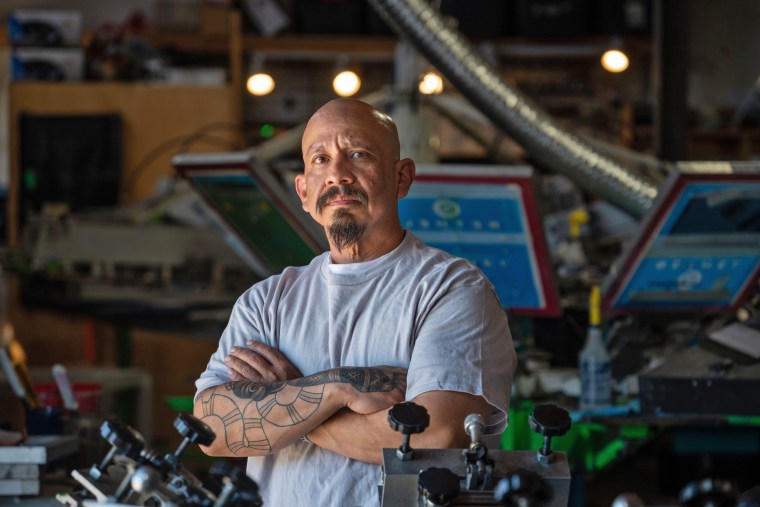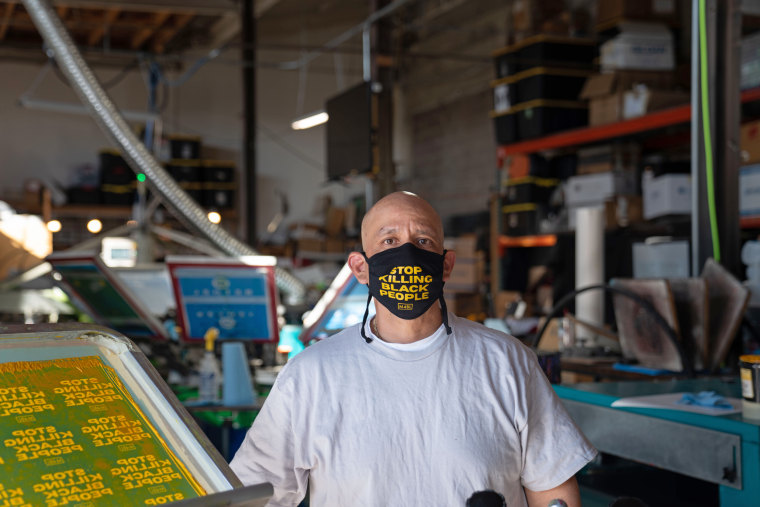WASHINGTON — A California screen printer is suing the U.S. Postal Service for seizing shipments of Black Lives Matter masks intended to protect demonstrators from Covid-19 during protests following the May 2020 murder of George Floyd.
The cloth masks, with slogans like "Stop killing Black people" and "Defund police," were purchased by the Movement for Black Lives (M4BL) and were meant to be shipped to D.C., St. Louis, New York City and Minneapolis, where Floyd was killed by a police officer. But four boxes containing about 500 masks each were marked as "Seized by law enforcement" and their shipment was delayed more than 24 hours.
The lawsuit, filed on Wednesday and shared first with NBC News, accuses U.S. Postal Service and U.S. Postal Inspection Service officials of violating constitutional rights under the Fourth Amendment by improperly seizing the boxes without probable cause, a warrant, or even reasonable suspicion. The lawsuit also raises the possibility that officials violated the First Amendment by seizing the masks because of their political messaging.
Movement Ink owner René Quiñonez, who owns the screen-printing business in Oakland, California, that manufactured the masks, told NBC News that his small family business had been impacted by the seizure.
"For us as an organization, as a company, and as part of our community, our intent was to support the many activities that were going on across the country," Quiñonez told NBC News.
Quiñonez, his family, and at least a dozen employees and volunteers "worked around the clock" to produce and pack the masks in the first week of June 2020, according to the lawsuit filed on his behalf by the Institute for Justice, a libertarian-leaning nonprofit law firm.

The lawsuit states that Movement Ink carved out a niche by building relationships "with activist movements, organizations, nonprofits, and individual organizers, who relied on René and Movement Ink for various screen-printing needs."
In an interview, Quiñonez said he had a jovial relationship with U.S. Postal Service employees, who knew he frequently mailed out clothing items with expedited shipping. Those relationships went cold after his items were seized, he said, as did some of his business relationships with activists.
"When there's an organization or a company that now has a reputation for being a target of law enforcement, people don't want to do business with them," Quiñonez said. "Even the people that are like-minded, that know that there are fundamental flaws in the way that we address things, they need to protect their interests. So we lost business."
The seizure of the masks “created a pall of suspicion, distraction, uncertainty, and confusion around René and Movement Ink,” the lawsuit states. The “baseless seizures and searches,” the lawsuit states, caused significant emotional and mental distress “not just because of his and Movement Ink’s financial and reputational hits, but because he and Movement Ink have been effectively shut out of a movement and a community that they spent (and continue to spend) years investing their time and energy in.”
“Instead of focusing on printing and shipping political Covid-protective masks and other apparel, René and Movement Ink had to waste time figuring out why their innocuous packages were in the hands of law enforcement, and how to get them released, while also fielding questions, concerns, and even accusations from partners, community members, and social media commenters,” the lawsuit reads. “René, Movement Ink, and their partners were left wondering why these Covid- protective political masks were in the hands of law enforcement officials instead of on the faces of political protestors.”
The Postal Service did not immediately respond to a request for comment.
In a letter to Rep. Barbara Lee in June 2020, the Postal Service claimed that the parcels "were detained solely because the external physical characteristics of the parcels were consistent with parcels in other non-related instances that were confirmed to contain nonmailable matter, specifically controlled substances."
But the lawsuit claims that the "neatly taped, nondescript brown boxes" had clear labels, a category that includes "millions of packages shipped around the country every day." The lawsuit states that internal notes said that the boxes contained "BLM MASKS," although it is not clear when that note was added, whether it was when the masks were seized or after media reports on the seizure of the masks.
"It is not clear whether Defendants knew that the packages contained — in Defendants’ words — 'BLM MASKS' before seizing the packages," the lawsuit states. "If Defendants knew that the packages contained — in Defendants’ words — 'BLM MASKS' before seizing the packages, Defendants violated the First Amendment by seizing packages because of their political messages."
The seizure of BLM masks came in the chaotic weeks after Floyd's death, and days after police violently cleared protesters out of the area surrounding the White House and former President Donald Trump posed for photos with a Bible. Attorney General William Barr had vowed a crackdown on rioters, and even called in officers from the Bureau of Prisons to D.C., who fired pepper balls at demonstrators.
During the Trump administration, federal prosecutors took an aggressive approach to demonstrations, even bringing a case against a band member after he posted professionally shot promotional images of himself posing in front of a police vehicle with a fake Molotov cocktail.
Quiñonez hopes that Americans will be concerned about the seizure of the masks regardless of their political beliefs.
"The fact that our government can just seize private property — either because of just general suspicion or because they know its political commentary — that's a scary reality that we live in," Quiñonez said.

